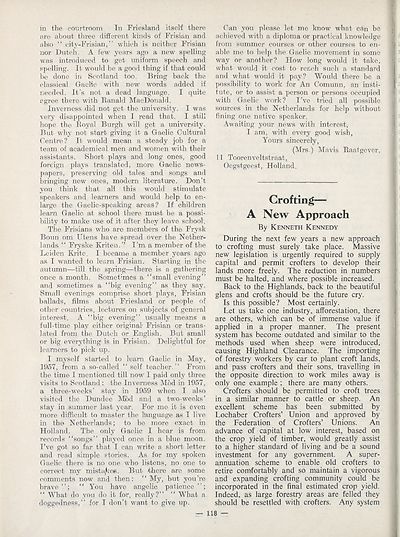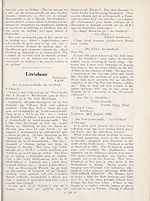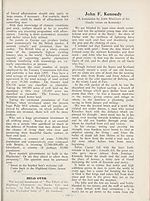An Comunn Gàidhealach Publications > Gaidheal > Volumes 58--62(part), January, 1963--March 1967
(362) Page 118
Download files
Complete book:
Individual page:
Thumbnail gallery: Grid view | List view

in the courtroom In Friesland itself there
are about three different kinds of Frisian and
also “ city-Frisian,” which is neither Frisian
nor Dutch. A few years ago a new spelling
was introduced to get uniform speech and
spelling. It would be a good thing if that could
be done in Scotland too. Bring back the
classical Gaelic with new words added if
needed. It’s not a dead language. I quite
agree there with Ranald MacDonald.
Inverness did not get the university. I was
very disappointed when I read that. I still
hope the Royal Burgh will get a university.
But why not start giving it a Gaelic Cultural
Centre? It would mean a steady job for a
team of academical men and women with their
assistants. Short plays and long ones, good
foreign plays translated, more Gaelic news¬
papers, preserving old tales and songs and
bringing new ones, modern literature. Don’t
you think that all this would stimulate
speakers and learners and would help to en¬
large the Gaelic-speaking areas? If children
learn Gaelic at school there must be a possi¬
bility to make use of it after they leave school.
The Frisians who are members of the Frysk
Boun om Utens have spread over the Nether¬
lands “ Fryske Kriten.’’ I’m a member of the
Leiden Krite. I became a member years ago
as I wanted to learn Frisian. Starting in the
autumn—till the spring—there is a gathering
once a month. Sometimes a “small evening’’
and sometimes a “big evening” as they say.
Small evenings comprise short plays, Frisian
ballads, films about Friesland or people of
other countries, lectures on subjects of general
interest. A “big evening” usually means a
full-time play either original1 Frisian or trans¬
lated from the Dutch or English. But small
or big everything is in Frisian. Delightful for
learners to pick up.
I myself started to learn Gaelic in May,
1957, from a so-called “ self teacher.” From
the time I mentioned till now11 paid only three
visits to Scotland : the Inverness Mod in 1957,
a three-weeks’ stay in 1959 when I also
visited the Dundee Mod and a two-weeks’
stay in summer last year. For me it is even
more difficult to master the language as I live
in the Netherlands; to be more exact in
Holland. The only Gaelic I hear is from
records “songs” played once in a blue moon.
I’ve got so far that I can write a short letter
and read simple stories. As for my spoken
Gaelic there is no one who listens, no one to
correlct my mistakes. But there are some
comments now and then: “ My, but you’re
brave”; “ You have angelic patience”;
“ What do you do it for, really?” “ What a
doggedness,” for I don’t want to give up.
Can you please let me know what can be
achieved with a diploma or practical knowledge
from summer courses or other courses to en¬
able me to help the Gaelic movement in some
way or another? How long would it take,
what would it cost to reach such a standard
and what would it pay? Would there be a
possibility to work for An Comunn, an insti¬
tute, or to assist a person or persons occupied
with Gaelic work? I’ve tried all possible
sources in the Netherlands for help without
fining one native speaker.
Awaiting your news with interest,
I am, with every good wish,
Yours sincerely,
(Mrs.) Mavis Raatgever,
11 Toorenveltstraat,
Oegstgeest, Holland.
Crofting—
A New Approach
By Kenneth Kennedy
During the next few years a new approach
to crofting must surely take place. Massive
new legislation is urgently required to supply
capital and permit crofters to develop their
lands more freely. The reduction in numbers
must be halted, and where possible increased.
Back to the Highlands, back to the beautiful
glens and crofts should be the future cry.
Is this possible? Most certainly.
Let us take one industry, afforestation, there
are others, which can be of immense value if
applied in a proper manner. The present
system has become outdated and similar to the
methods used when sheep were introduced,
causing Highland Clearance. The importing
of forestry workers by car to plant croft lands,
and pass crofters and their sons, travelling in
the opposite direction to work miles away is
only one example ; there are many others.
Crofters should be permitted to croft trees
in a similar manner to cattle or sheep. An
excellent scheme has been submitted by
Lochaber Crofters’ Union and approved by
the Federation of Crofters’ Unions. An
advance of capital at low interest, based on
the crop yield of timber, would greatly assist
to a higher standard of living and be a sound
investment for any government. A super¬
annuation scheme to enable old crofters to
retire comfortably and so maintain a vigorous
and expanding crofting community could be
incorporated in the final estimated crop yield.
Indeed, as large forestry areas are felled they
should be resettled with crofters. Any system
118 —
are about three different kinds of Frisian and
also “ city-Frisian,” which is neither Frisian
nor Dutch. A few years ago a new spelling
was introduced to get uniform speech and
spelling. It would be a good thing if that could
be done in Scotland too. Bring back the
classical Gaelic with new words added if
needed. It’s not a dead language. I quite
agree there with Ranald MacDonald.
Inverness did not get the university. I was
very disappointed when I read that. I still
hope the Royal Burgh will get a university.
But why not start giving it a Gaelic Cultural
Centre? It would mean a steady job for a
team of academical men and women with their
assistants. Short plays and long ones, good
foreign plays translated, more Gaelic news¬
papers, preserving old tales and songs and
bringing new ones, modern literature. Don’t
you think that all this would stimulate
speakers and learners and would help to en¬
large the Gaelic-speaking areas? If children
learn Gaelic at school there must be a possi¬
bility to make use of it after they leave school.
The Frisians who are members of the Frysk
Boun om Utens have spread over the Nether¬
lands “ Fryske Kriten.’’ I’m a member of the
Leiden Krite. I became a member years ago
as I wanted to learn Frisian. Starting in the
autumn—till the spring—there is a gathering
once a month. Sometimes a “small evening’’
and sometimes a “big evening” as they say.
Small evenings comprise short plays, Frisian
ballads, films about Friesland or people of
other countries, lectures on subjects of general
interest. A “big evening” usually means a
full-time play either original1 Frisian or trans¬
lated from the Dutch or English. But small
or big everything is in Frisian. Delightful for
learners to pick up.
I myself started to learn Gaelic in May,
1957, from a so-called “ self teacher.” From
the time I mentioned till now11 paid only three
visits to Scotland : the Inverness Mod in 1957,
a three-weeks’ stay in 1959 when I also
visited the Dundee Mod and a two-weeks’
stay in summer last year. For me it is even
more difficult to master the language as I live
in the Netherlands; to be more exact in
Holland. The only Gaelic I hear is from
records “songs” played once in a blue moon.
I’ve got so far that I can write a short letter
and read simple stories. As for my spoken
Gaelic there is no one who listens, no one to
correlct my mistakes. But there are some
comments now and then: “ My, but you’re
brave”; “ You have angelic patience”;
“ What do you do it for, really?” “ What a
doggedness,” for I don’t want to give up.
Can you please let me know what can be
achieved with a diploma or practical knowledge
from summer courses or other courses to en¬
able me to help the Gaelic movement in some
way or another? How long would it take,
what would it cost to reach such a standard
and what would it pay? Would there be a
possibility to work for An Comunn, an insti¬
tute, or to assist a person or persons occupied
with Gaelic work? I’ve tried all possible
sources in the Netherlands for help without
fining one native speaker.
Awaiting your news with interest,
I am, with every good wish,
Yours sincerely,
(Mrs.) Mavis Raatgever,
11 Toorenveltstraat,
Oegstgeest, Holland.
Crofting—
A New Approach
By Kenneth Kennedy
During the next few years a new approach
to crofting must surely take place. Massive
new legislation is urgently required to supply
capital and permit crofters to develop their
lands more freely. The reduction in numbers
must be halted, and where possible increased.
Back to the Highlands, back to the beautiful
glens and crofts should be the future cry.
Is this possible? Most certainly.
Let us take one industry, afforestation, there
are others, which can be of immense value if
applied in a proper manner. The present
system has become outdated and similar to the
methods used when sheep were introduced,
causing Highland Clearance. The importing
of forestry workers by car to plant croft lands,
and pass crofters and their sons, travelling in
the opposite direction to work miles away is
only one example ; there are many others.
Crofters should be permitted to croft trees
in a similar manner to cattle or sheep. An
excellent scheme has been submitted by
Lochaber Crofters’ Union and approved by
the Federation of Crofters’ Unions. An
advance of capital at low interest, based on
the crop yield of timber, would greatly assist
to a higher standard of living and be a sound
investment for any government. A super¬
annuation scheme to enable old crofters to
retire comfortably and so maintain a vigorous
and expanding crofting community could be
incorporated in the final estimated crop yield.
Indeed, as large forestry areas are felled they
should be resettled with crofters. Any system
118 —
Set display mode to:
![]() Universal Viewer |
Universal Viewer | ![]() Mirador |
Large image | Transcription
Mirador |
Large image | Transcription
| An Comunn Gàidhealach > An Comunn Gàidhealach Publications > Gaidheal > Volumes 58--62(part), January, 1963--March 1967 > (362) Page 118 |
|---|
| Permanent URL | https://digital.nls.uk/127153125 |
|---|
| Description | This contains items published by An Comunn, which are not specifically Mòd-related. It includes journals, annual reports and corporate documents, policy statements, educational resources and published plays and literature. It is arranged alphabetically by title. |
|---|
| Description | A collection of over 400 items published by An Comunn Gàidhealach, the organisation which promotes Gaelic language and culture and organises the Royal National Mòd. Dating from 1891 up to the present day, the collection includes journals and newspapers, annual reports, educational materials, national Mòd programmes, published Mòd literature and music. |
|---|---|
| Additional NLS resources: |
|

